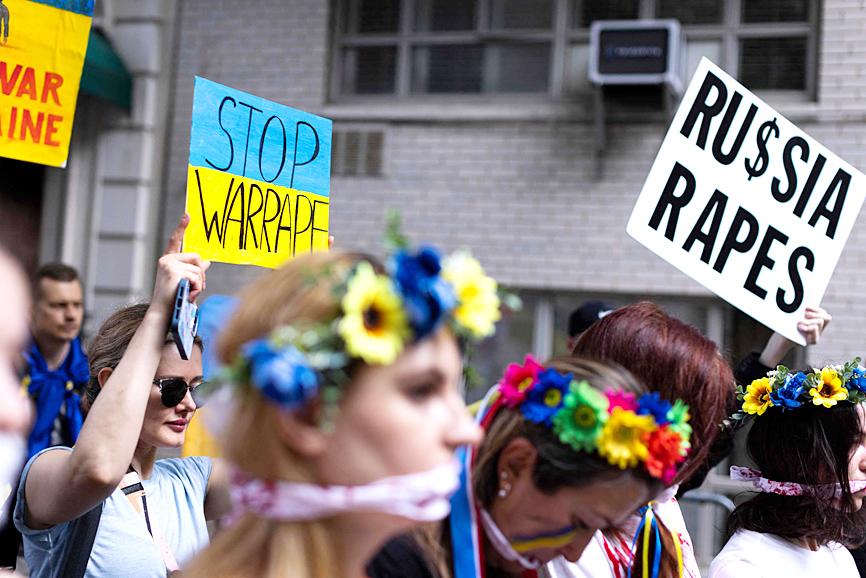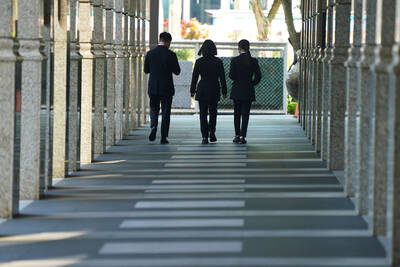When war erupted in Ukraine and reports that Russian soldiers were using rape as a weapon of war began to surface, Yulia Sporysh wasn’t sure she was the right person to help.
But urged by partners at Divchata, a small NGO that mainly works on health education for girls, she set up a hotline in April to advise and support victims.
Ukrainian officials as high up as President Volodymyr Zelensky were accusing Russian troops of widespread and systemic sexual abuse and Divchata was poised by the phone.

Photo: AFP
Yet after three months of war, it has barely rung at all.
“There’s still huge, huge stigma. There’s this idea the victim might have brought it on themselves,” Sporysh said, explaining why people may not be coming forward.
“We have requests from relatives and from volunteers,” she added, “but not directly from victims.”

Photo: AFP
Moscow’s invasion has spurred a wave of allegations of sexual violence perpetrated by its troops in Ukraine.
Zelensky said in April that Russian troops who withdrew after trying to capture the capital Kyiv had left in “hundreds” of rape victims in their wake, including children.
At least one woman in the south of the country said she was raped by several Russian soldiers. Kyiv announced this week it was initiating the first legal proceedings against one of Moscow’s soldiers for sexual violence.
‘TOO ASHAMED’
Still, activists tasked with helping people whose lives have been shattered by rape are first having to persuade them to break their silence.
“Victims, for the most part, are not ready to report to law enforcement and some of them are not even ready to receive specialized medical treatment,” says Yuliia Anasova, a lawyer with La Strada.
The well-known rights group, which also has a phone number for the war’s rape victims, has received just over a dozen calls in relation to 17 people — including one man.
“He says he is too ashamed to see a doctor,” Anasova said.
Everyone who reached out was raped by Russian soldiers and mostly in their own homes, she said, but only three had filed official complaints.
“They are even less ready to go to the police than to seek medical treatment,” Anasova said.
The lawyer said Ukraine’s often poorly trained investigators have recently modernized how they work, but still subject victims to several interrogations and medical examinations that contravene international recommendations.
A dedicated police unit that has been working in the Kyiv region has identified 13 victims of alleged sexual abuse by Russian soldiers, Deputy Interior Minister Kateryna Pavlichenko said.
‘INFORMATION, NOT EMOTION’
But military psychologist Natalia Zaratska believes it’s too early for police to go out looking for victims.
“It would make more sense to talk to them in six months, when they have a better handle on their memories,” she said. “For a criminal investigation, you need information, not emotion.”
Still, Zaratska believes there is “urgent” work to be done. She understands victims need support but she also believes “they won’t come to us. So we have to go to them.”
That’s why she goes at least three times a week to Bucha, outside Kyiv, a town whose name is now synonymous with harrowing allegations of atrocities carried out by Russian soldiers, including summary executions.
Hushed talk of sexual violence carried out by Russian soldiers has permeated all corners of the town where villagers were found shot dead with their hands bound behind their backs after their occupiers withdrew.
“A doctor told me that for one month, the ambulance only picked up women who had this problem,” said 45-year-old plumber Volodymyr Strilets in Bucha.
Andrei Halavin, the priest who presides over the local Orthodox church, is navigating how best to steer the conversation with believers.
‘BEST NOT TO TALK ABOUT IT’
“It’s best not to talk about it,” he said in Bucha draped in black clerical robes. “People have to get on with their lives.”
But he sought to reassure congregants that victims had not transgressed their faith.
“I have to tell them that it is not a sin to have been raped.”
Zaratska, the military psychologist, said she started going to Bucha to talk to residents about their experience of Russia’s occupation and soon was referred to rape victims.
She said the volume of complaints meant that the three psychologists working in the region were nowhere near enough. “Twelve or 16” are needed, Zaratska she said.
Again, she said, the victims were often hesitant to broach the subject of their experience.
“It’s only when they are around someone who understands that in wartime, rape is a form of torture,” she said.
She said they also needed to be reassured their testimonies would be handled with sensitivity.
Several officials have controversially made public graphic details of rape and sexual abuse allegations, including Ukraine’s human rights ombudswoman who left the post after describing an incident in which a young girl was violated with a kitchen utensil.
“It’s totally unethical,” said Zaratska. “It can create a second trauma. If society were more sensitive on this issue, we might hear from victims more.”

JUNE 30 to JULY 6 After being routed by the Japanese in the bloody battle of Baguashan (八卦山), Hsu Hsiang (徐驤) and a handful of surviving Hakka fighters sped toward Tainan. There, he would meet with Liu Yung-fu (劉永福), leader of the Black Flag Army who had assumed control of the resisting Republic of Formosa after its president and vice-president fled to China. Hsu, who had been fighting non-stop for over two months from Taoyuan to Changhua, was reportedly injured and exhausted. As the story goes, Liu advised that Hsu take shelter in China to recover and regroup, but Hsu steadfastly

Taiwan’s politics is mystifying to many foreign observers. Gosh, that is strange, considering just how logical and straightforward it all is. Let us take a step back and review. Thanks to the Chinese Nationalist Party (KMT) and the Taiwan People’s Party (TPP), starting this year people will once again have Christmas Day off work. In 2002, the Scrooges in the Democratic Progressive Party (DPP) said “bah, humbug” to that. The holiday is not actually Christmas, but rather Constitution Day, celebrating the enactment of the Constitution of the Republic of China (ROC) on December 25, 1947. The DPP and the then pan-blue dominated legislature

Focus Taiwan reported last week that government figures showed unemployment in Taiwan is at historic lows: “The local unemployment rate fell 0.02 percentage points from a month earlier to 3.30 percent in May, the lowest level for the month in 25 years.” Historical lows in joblessness occurred earlier this year as well. The context? Labor shortages. The National Development Council (NDC) expects that Taiwan will be short 400,000 workers by 2030, now just five years away. The depth of the labor crisis is masked by the hundreds of thousands of migrant workers which the economy absolutely depends on, and the

If you’ve lately been feeling that the “Jurassic Park” franchise has jumped an even more ancient creature — the shark — hold off any thoughts of extinction. Judging from the latest entry, there’s still life in this old dino series. Jurassic World Rebirth captures the awe and majesty of the overgrown lizards that’s been lacking for so many of the movies, which became just an endless cat-and-mouse in the dark between scared humans against T-Rexes or raptors. Jurassic World Rebirth lets in the daylight. Credit goes to screenwriter David Koepp, who penned the original Jurassic Park, and director Gareth Edwards, who knows